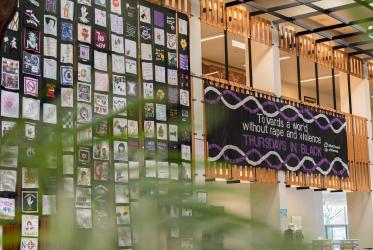Fifty adolescents, young people, teachers, theologians, health professionals, people living with HIV and religious leaders met in Abuja from 22-26 May to discuss positive masculinities and femininities in faith communities.
Voices of adolescents and young people on gender and sexuality have highlighted issues of gender expression among young people and the importance of knowing the body, the characteristics of reproductive health and the need to create safe spaces for children and parents.
Ayoko Bahun-Wilson, West Africa regional coordinator for the World Council of Churches Ecumenical HIV and AIDS Initiatives and Advocacy programme (WCC-EHAIA), said: “Children’s openness and presence in the consultation is the outcome of previous work done in the states of Kaduna and Port Harcourt on issues related to sexual and gender based violence and sexual reproductive health”.
The meeting highlighted the fact that adolescents and young people need their spaces to discuss their challenges and share their experiences to build and reinforce their self esteem.
If adolescents and young people are to open themselves, there is need of discussing major issues identified related to being an adolescent or a young person, including lack of trust by parents, lack of communication between parents and children, discipline and low self-esteem. Unpacking masculinities and femininities in a way that provides healthy relationships between girls and boys, women and men, and room to enjoy abundant life was the cornerstone of this consultation.
To support the above, Prof. Kunbi Labeodan from the Department of Religious Studies, University of Ibadan, and the coordinator of the Circle of Concerned African Women Theologians, said “a work of reorientation, starting from the grassroots, the homes, churches, and mosques, needs to be done as one reworks the mentality”.
Prof. Ezra Chitando, EHAIA theology consultant, concurred with the above by saying: ”Do we have gender justice for our girls and women, looking at how masculinity and femininity are being perceived?" Therefore, a work of deconstruction should start from homes, families, churches, mosques, workplaces and society to provide the same opportunities to men and women.
Adolescents and young people acknowledged the need to work on stigma and discrimination that is prevailing in schools and other spaces, and they committed to champion this starting with themselves. Tolulope Ogunseye, a student from Port Harcourt, quoted the use of the EHAIA series “Youth Manual on anti-stigma messages” (2005) developed by the West Africa Region and emphasized that the manual has helped St Michael Anglican College to deal with issues of stigma and young people living with HIV.
Discussing masculinities, femininities and sacred texts, Rev. Pauline Wanjiru Njiru, eastern Africa regional coordinator of EHAIA said: “We as leaders cannot speak of giving or denying young people the permission to use condoms since in the first place they don't ask us for permission to have sex. Our role is to give them correct information to help them make informed decisions.”
Sexual and gender based violence are rampant in Nigeria and, together with the organizers, the Thursdays in Black campaign was discussed and commitment shown for a world free from violence and rape.
Participants agreed on the outline of a manual which will highlight the voices of young people on masculinities, femininities, sexuality, gender roles, sexual and reproductive health, early and forced marriage, social media and youth behavior challenges. This manual will help adolescents, young people and religious leaders to listen to each other, and will be widely disseminated upon completion.









